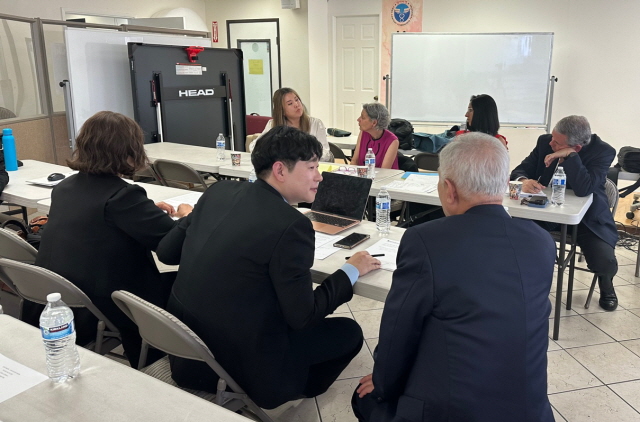AAAA, fee schedule increase, MNR modification and abolition of PPO Plans.
By Samuel Cho L.Ac.
It has been controversial among acupuncturists who deal with insurance companies. Many acupuncturists do not participate in American Specialty Health, ASH. No matter how much care is given, the amount that can be received from ASH has been $41 for years, and the fact that they must spend lots of time doing paperwork to ask permission for more treatments.
On the 30th of May, a momentous occasion unfolded as four ASH executives visited the office of the Asian American Acupuncture Association (AAAA; President Isaac Kim) in LA Koreatown, California. This visit, a pivotal moment in the ongoing dialogue between ASH and the acupuncturists in the Korean community, underscored the progress made in the Fee Schedule Raise campaign.
The visit of the ASH executives on the 30th of May was a significant event, marking the culmination of the Fee Schedule Raise campaign that the members of the acupuncture community, with unwavering dedication, have been diligently pursuing for the past three years. This campaign, which involved regular meetings and collecting crucial information on the increase in ASH fee schedule, the simplification of MNR, and other unfair experiences, was instrumental in prompting ASH to visit the Korean community and listen to their concerns.
The executives who visited that day included Vice President Douglas Metz, DC, who oversees medical services; Jin Ah, Clinical Services Quality Assessment Manager for MNR; Justine Greene, MD, Senior Medical Director; and Jaclyn Parker, Senior Vice President of Operations. The event was further enriched by the active participation of many Korean doctors of Acupuncture, who attended and continued the Q&A session, demonstrating their crucial role in the ongoing dialogue.
On this day, AAAA presented a concise overview and shared the following key points with ASH: The treatment fee has only increased by $1 over the past 25 years. They proposed stopping the lump-sum payment method for treatment fees, revising and abolishing the MNR system, and recognizing fees similar to general PPO insurance for each treatment unit. They also emphasized the need for clear, straightforward communication with patients and medical professionals when policy changes occur.
Vice President Douglas Metz explained, “ASH, which started in 1987, currently provides services to 60 million American patients and manages 155,000 medical personnel nationwide. Approximately 3,000 Korean medicine doctors in California maintain ASH network provider contracts.”
Vice President Metz also said he was well aware of the content revealed by AAAA but said, “Today is the first meeting on the relevant issue, so I hope we can understand each other’s positions more. I will continue to ask for your opinions in the future.” He added, “I plan to convey the stories mentioned today to the relevant parties when I return to the company.”
Vice President Metz added, “The lump-sum payment method (Bundle) is the current direction that CMS and other health insurance companies are moving toward.”
A Vietnamese acupuncturist who attended the meeting said, “ASH contacts acupuncturists in places like Texas and asks them to join the network, saying that they will be paid for a treatment fee of $75 per session,” and “It makes no sense for California to maintain a fee of $41 continuously.”
Vice President Metz responded, “Gas prices and market conditions are different in California and Texas, and this can happen in a free market economic system.”
Meanwhile, the issue of call center operation was also discussed. Another participant complained, “I spent up to an hour and a half on the phone with a call center employee,” and “There are many problems on site, such as call center employees giving patients incorrect information and patients requesting services that are not covered by the fee at the acupuncture clinic based on this information.”
In response, Senior Vice President Jacqueline said, “Currently, the typical answer time for call center employees is 30 seconds, but the goal is to answer within 60 seconds, and this is being well maintained, but in the future, we will monitor call center employees’ answering times more carefully and provide training if necessary.”
Regarding the point, ASH expressed sympathy, saying, “We recognize that continuous education is necessary for call center employees in the future.”
In particular, when an attendee pointed out that it is unreasonable to apply MNR, which many Korean acupuncturists find uncomfortable, to patients with PPO plans.





































